Iranian And Chinese Foreign Ministers Discuss Resumption Of Nuclear Talks
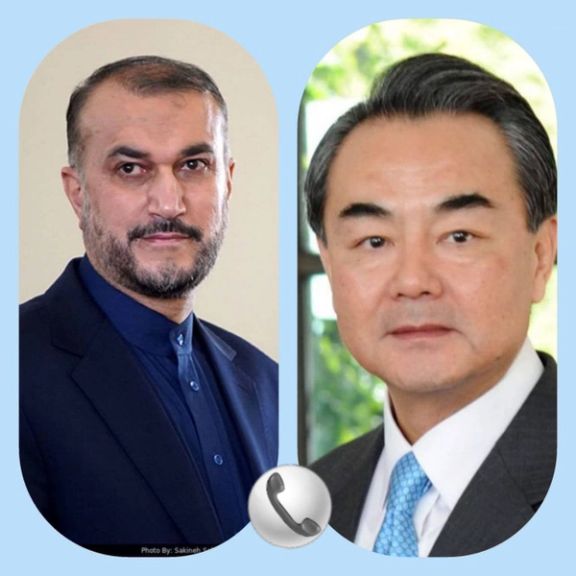
Following a phone conversation with Russia's foreign minister, Iran’s top diplomat also spoke with his Chinese counterpart over the resumption of nuclear talks.

Following a phone conversation with Russia's foreign minister, Iran’s top diplomat also spoke with his Chinese counterpart over the resumption of nuclear talks.
China’s Foreign Minister Wang Yi wished Amir-Abdollahian a speedy recovery from Covid-19 and the two sides discussed a range of issues including the upcoming resumption of multilateral nuclear talks in Vienna at the end of November.
Iran’s foreign minister told his Chinese counterpart that he hoped the United States and the three European power, the United Kingdom, France and Germany enter the negotiation “with realism” so that agreement can be reached quickly.
Amir-Abdollahian added that “America cannot continue the failed policy of maximum pressure and economic terrorism while claiming to be in favor negotiations.” He also said Iran’s cooperation with the UN nuclear watchdog, the IAEA, will continue smoothly “within the framework of agreements and regulations.”
The Iranian foreign ministry statement late Saturday claimed that the Chinese foreign minister said the United States is the main cause of current problems related to the 2015 nuclear agreement, the JCPOA.
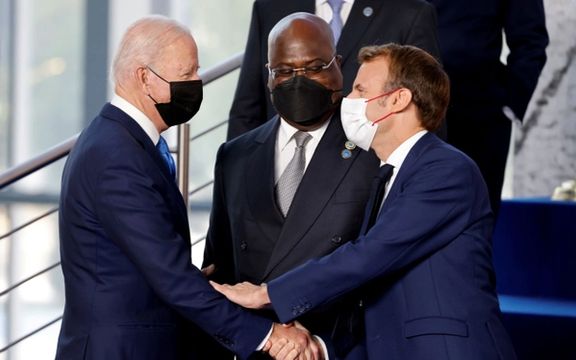
France is taking the role of “bad cop” in the run-up to Iran’s nuclear talks with world powers November 29, several media outlets in Iran said this week.
This followed the French foreign ministry spokeswoman saying Thursday that Paris was keeping open the option of moving censure of Tehran at the mid-November board meeting of the International Atomic Energy Agency (IAEA), the United Nations cooperation and monitoring body.
There had been speculation in September that the United States or Europe might move a resolution at an earlier board meeting critical of Iran, which reduced IAEA access earlier this year after the killing of a nuclear scientist and attacks on its atomic sites.
Nour News, a news website affiliated with the Secretary of Iran's Supreme National Security Council (SNSC) Ali Shamkhani, published a video Saturday dubbed “France and Commencement of Bad Cop Game.”
The video suggested that France had taken up the role in response to "immediate positive reaction of most partners in the negotiations" to Deputy Foreign Minister Ali Bagheri-Kani announcing Iran would resume talks in Vienna November 29 aimed at reviving the 2015 deal, the JCPOA (Joint Comprehensive Plan of Action). Nour described the words from spokeswoman Anne-Claire Legendre as “threatening.”
‘Diplomatic spearhead’
The state-owned, English-language paper Tehran Times on Friday also called France a bad cop. The paper suggested that Iran setting a date for talks had lowered diplomatic tensions and so prompted Paris to “spearhead a diplomatic campaign against Iran.”
"France moved to ramp up diplomatic pressure on Iran by putting more emphasis on the current state of play between Tehran and the UN nuclear watchdog," the paper noted. But it said Paris was unlikely to press ahead with censuring Iran as this “would probably anger Iran at a time when it announced a return to Vienna only grudgingly.”
Mikhail Ulyanov, Russian envoy to the IAEA, poured oil on any troubled waters with a tweet citing the Tehran Times and insisting that "no single participant in the ViennaTalks will do anything that can derail negotiations on JCPOA." Moscow has consistently stressed the importance of the Vienna talks ensuring that both that United States – which left the JCPOA in 2018 – and Iran respect the terms of the agreement.
On Saturday Iranian Foreign Minister Hossein Amir-Abdollahian spoke by phone to Russian counterpart Sergei Lavrov. According to the Iranian foreign ministry, Amir-Abdollahian told Lavrov that talks would make rapid progress once the US and the European JCPOA signatories – France, Germany, and the United Kingdom – ruled out "demands exceeding the JCPOA.” There have been various reports that the US has tried to secure an Iranian commitment to a ‘follow on’ agreement covering regional defense issues.
‘Iran’s full briefcase’
In a commentary headlined "November 29 With Iran's Full Briefcase," Javan newspaper, affiliated with IRGC, argued that Iran was in a stronger position than in 2013, when negotiation began leading up to the JCPOA.
It is widely argued that Iran has been boosted by the failure of US ‘maximum pressure’ sanctions − introduced by the Trump administration in 2018 − to secure their stated aims including Iran ending all uranium enrichment, scrapping missile defense, and breaking links with regional allies.
Javan also pointed out that the Iranian nuclear program had significantly expanded. "Iran is going to sit at the table for talks with full hands," it argued, pointing to its stockpiles of 210kg of uranium enriched to 20 percent and 25kg enriched to 60 percent.
Under the JCPOA, Iran enriched no higher than 3.67 percent, but began exceeding various JCPOA limits in 2019, a year after the US left the agreement. Tehran started 20 percent enrichment in January and 60 percent enrichment in April, explaining the moves as responses to US sanctions, and to the killing of a nuclear scientist and attacks on its atomic facilities widely attributed to Israel, which has opposed the JCPOA.
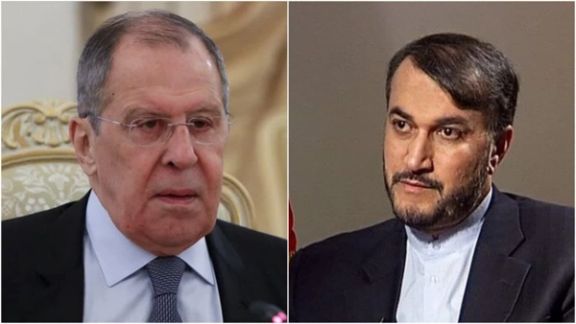
Russia announced that Foreign Minister Sergei Lavrov held a phone conversation with his Iranian counterpart over the resumption of the nuclear talks this month.
The phone call on Saturday took place at the request of the Iranian side, the announcement said. Iran’s foreign minister Hossein Amir-Abdollahian who is in quarantine for contracting the coronavirus, discussed the prospects for resuming nuclear talks in Vienna later this month.
The two foreign ministers spoke in favor of restoring the nuclear deal “in its original balanced configuration, approved by the UN Security Council. this is the only correct way to ensure the rights and interests of all participants in the comprehensive agreements," the ministry said.
Iran, which suspended the multilateral Vienna talks in June after the election of its hardliner president Ebrahim Raisi, is trying to gain Russia support before the talks resume. Tehran has been giving signals of a adopting a harder posture.
Lavrov and Amir-Abdollahian also discussed the upcoming visit of Rafael Grossi to Tehran, the director of UN nuclear watchdog, the International Atomic Energy Agency.
The two sides also discussed bilateral and regional issues, including Afghanistan and the situation in South Caucasus.
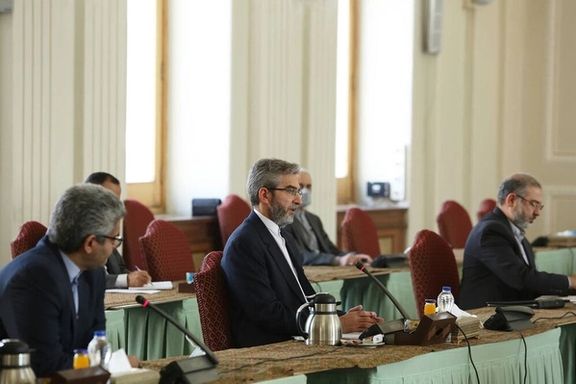
While nuclear talks between Iran and world powers are set to resume this month, there is little optimism among Iranian pundits about a quick, positive outcome.
News website Rouydad24 in Iran says the Raisi administration has failed in nearly all foreign negotiations during its first six months in office. The talks between Iran and Turkmenistan over the two countries' economic cooperation have been discontinued without signing even a single agreement.
The long meeting in Tehran between Afghanistan's neighbors remained fruitless and even annoyed the Taliban who were not invited to the meeting. And there are indications that the presence of individuals close to former chief negotiator Saeed Jalili in Iran's nuclear negotiating team is not likely to have any tangible result in the same way that months of negotiations led by Jalili before 2013 led to nowhere.
After Ali Bagheri-Kani Iran's chief nuclear negotiator said in a November 3 tweet that Iran has " agreed to restart the talks on November 29 in Vienna," Ali Vaez, the director of Iran Project at the Crisis Group, noted in a tweet on November 4 that Bagheri has used the word "starting" rather than "continuing" negotiations, and has called for "removing the sanctions" rather than "reviving the JCPOA."
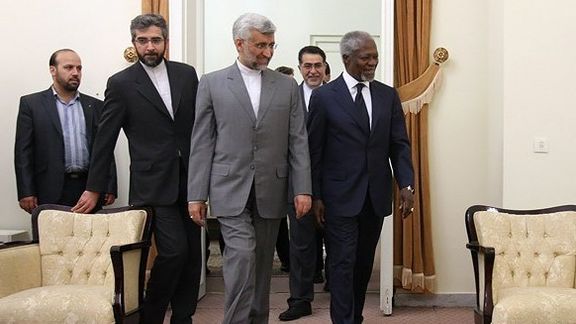
Rouydad24 wrote that looking at the Iranian foreign ministry's approach to the negotiations, it is unlikely that direct talks with the United States would be on its agenda. Also, it is clear that the team will be led by Bagheri, but it is still not known who else will be part of the negotiating team.
Meanwhile, Diako Hosseini, a commentator on Iran's foreign policy said in an interview that "The United States is not prepared to give Iran the guarantee Tehran wants about Washington's behavior toward Iran in the future," adding that "Plan B, that is a military strike on Iran will never happen even if the talks with Iran are not fruitful or even if such talks never start."
US President Joe Biden has spoken about Plan B if efforts to bring Iran to the negotiating table or reaching an agreement fail.
Hosseini said that the Plan B rhetoric is an outdated Trump tactic, adding that maximum pressures on Iran have led to nothing other than deepening the distrust on both sides and leading to the current impasse. He noted that based on Biden's declared policy on Iran taking an action such as attacking Iran will be impractical and catastrophic anyway.
Although some commentators in Iran and abroad have argued that sanctions have been ineffective in forcing Tehran to show flexibility, it was international sanctions that forced Iran to start nuclear negotiations in 2013.
Hosseini ruled out plan B as sheer propaganda and said he does not believe such a plan exists. He also noted that Iran might react to such measures by doing things that would make the situation even more complicated. However, he did not elaborate on Iran's possible actions.
The commentator further opined that such a plan is not likely to change Iran's position but reminded that next year the Republicans might win the majority in the US Congress and subsequently decide to leave the nuclear deal forever. This is one of the reasons Iran is after a guarantee about the continuation of the US commitment to the agreement.
Stressing that the talks to revive the JCPOA will be more difficult than the initial negotiations which led to the JCPOA, Hosseini said Tehran wishes to have the sanctions lifted, particularly the non-nuclear sanctions including restrictions on oil sales and international banking, and that is what has made returning to the talks more difficult.
However, he said negotiating, despite the existing distrust can prevent the deepening of the crisis. "Although it does not mean the talks can provide what Iran wants, yet they can be a beginning to the lifting of non-nuclear sanctions."
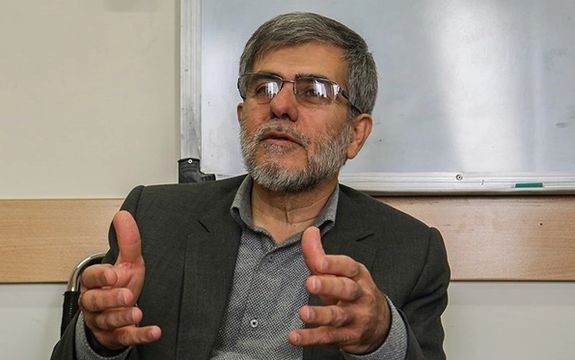
A hardline member of Iran’s parliament has said that the United States must discharge its nuclear deal commitments before it returns to multilateral talks.
Fereydoun Abbasi, a former head of Iran’s Atomic Energy Organization was quoted by Tasnim news agency close to the Revolutionary Guard as saying that the current government’s approach is different from the former president Hassan Rouhani’s administration.
“We should not look at America as the sheriff in town. If they want to negotiate with Iran, they should be just one country alongside other members of JCPOA,” Abbasi maintained. If the US intends to rejoin the 2015 nuclear agreement, it should also pay damages to Iran for having imposed sanctions, Abbasi added.
Iran suspended nuclear negotiations with World Powers in June when President Ebrahim Raisi won the presidential vote. As Tehran has delayed its return to the talks, it has continued enriching uranium and has boosted its stockpile.
This week a new date was set to resume the talks on November 29. Abbasi said that Iran should use both “soft and hard power” in this round of talks. “Soft power is people’s support and hard power is our nuclear and deterrent military progress,” the lawmaker emphasized.

The US State Department spokesman on Thursday said that according to provisions of the 2015 nuclear deal (JCPOA) Iran can never acquire a nuclear weapon.
The statement met with skepticism among reporters who insisted that nothing in the JCPOA explicitly bans Iran from pursuing nuclear weapons after some of its provision expire during this decade.
In an answer to a question if the United States intends to extend some of the expiring limitation on Iran, Spokesman Ned Price responded that the agreement bans Iran from acquiring a nuclear weapon and that is a “permanent” provision.
“What the JCPOA put forward was a permanent, was a verifiable mechanism to ensure that Iran is never able or allowed to acquire a nuclear weapon,” Price added.
Price went on to say that the US is interested first to revive the JCPOA, that former president Donald Trump abandoned in 2018 and make sure that Iran “is once again constrained.” He continued that “we will then use that JCPOA…as a baseline to negotiate what we have – the – not only to lengthen and strengthen the provisions of the deal, but to put on the table and to discuss, in a productive and hopefully useful way, other issues of concern, issues that are of concern not only to the United States, but also of concern to our allies and partners in the region as well.”
In effect, Price reiterated the initial Biden Administration goal of first resurrecting the 2015 deal and then continue negotiating over a better agreement and also the twin issues of Iran’s ballistic missiles and its regional behavior.
Critics of this approach have said that once the JCPOA is revived, the United States has to lift the most effective and damaging sanctions, which would mean throwing the Islamic Republic a financial lifeline. Once Tehran can sell its oil and receive the money, it would have no incentive to make further concessions.
Whether the US has demanded assurances from Tehran during the Vienna talks this year to continue negotiations after sanctions are lifted, is not known. What the spokesman did emphasize on Thursday was restoring control over Iran’s nuclear program first, and then “hope from there we’ll be able to engage in constructive diplomacy vis-à-vis the other challenges that Iran poses to the United States, to our allies, to our partners in the region.”
Asked directly what leverage the United States would have over Iran without the most important sanctions in the future, Price avoided an answer, repeating that Washington is “focused on that first task.”
A reporter asked that a permanent ban on Iran acquiring nuclear weapons “is simply not” in the JCPOA text. Price responded that “What we are relying on are the international instruments that have been negotiated and that, until recent years, had been in place that had permanently and verifiably constrained Iran’s ability to acquire a nuclear weapon.”
The reporter kept insisting that the only permanent provision in JCPOA is Iran’s commitment to comply with the Non-Proliferation Treaty (NPT), which North Korea disregarded and produced nuclear weapons. Price continued to insist that the JCPOA gives the international community “permanent instruments” to monitor Iran’s nuclear activities.